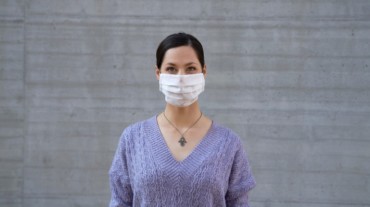
By now we all have become accustomed to the new way of life that dictates wearing masks before meeting someone or stepping out of our homes. But as the use of masks becomes a norm, social distancing—which was the first suggested measure to prevent the spread of covid-19—is being forgotten.
Now, you might wonder why we need to practice social distancing if we are wearing masks ALL the time. Well, the answer is fairly simple: scientists believe that simply wearing a mask may not be enough to prevent the spread of covid-19 without social distancing.
In the journal Physics of Fluids by AIP Publishing, researchers tested how five different types of mask materials impacted the spread of droplets that carry the coronavirus when we cough or sneeze.
Every material tested dramatically reduced the number of droplets that were spread. But at distances of less than 6 feet, enough droplets to potentially cause illness still made it through several of the materials.
“A mask definitely helps, but if the people are very close to each other, there is still a chance of spreading or contracting the virus,” said Krishna Kota, an associate professor at New Mexico State University and one of the article’s authors. “It does not just mask that will help. It’s both the masks and distancing.”
Also, read: Covid-19 can be stopped if 7 out of 10 people wear face masks consistently: Study

At the university, researchers built a machine that uses an air generator to mimic human coughs and sneezes. The generator was used to blow tiny liquid particles, like the airborne droplets of sneezes and coughs, through laser sheets in an airtight square tube with a camera.
They blocked the flow of the droplets in the tube with five different types of mask materials—a regular cloth mask, a two-layer cloth mask, a wet two-layer cloth mask, a surgical mask, and a medical-grade N-95 mask.
Each of the masks captured the vast majority of droplets, ranging from the regular cloth mask, which allowed about 3.6% of the droplets to go through, to the N-95 mask, which statistically stopped 100% of the droplets. But at distances of less than 6 feet, even those small percentages of droplets can be enough to get someone sick, especially if a person with covid-19 sneezes or coughs multiple times.
A single sneeze can carry up to 200 million tiny virus particles, depending on how sick the carrier is. Even if a mask blocks a huge percentage of those particles, enough could escape to get someone sick if that person is close to the carrier.
Select Topics of your interest and let us customize your feed.
PERSONALISE NOWAlso, read: Think face shields can protect you from coronavirus? It isn’t effective, says study
“Without a face mask, it is almost certain that many foreign droplets will transfer to the susceptible person,” Kota said. “Wearing a mask will offer substantial, but not complete, protection to a susceptible person by decreasing the number of foreign airborne sneeze and cough droplets that would otherwise enter the person without the mask. Consideration must be given to minimize or avoid close face-to-face or frontal human interactions, if possible.”
The study also did not account for leakage from masks, whether worn properly or improperly, which can add to the number of droplets that make their way into the air.
Get Latest Updates on Health News